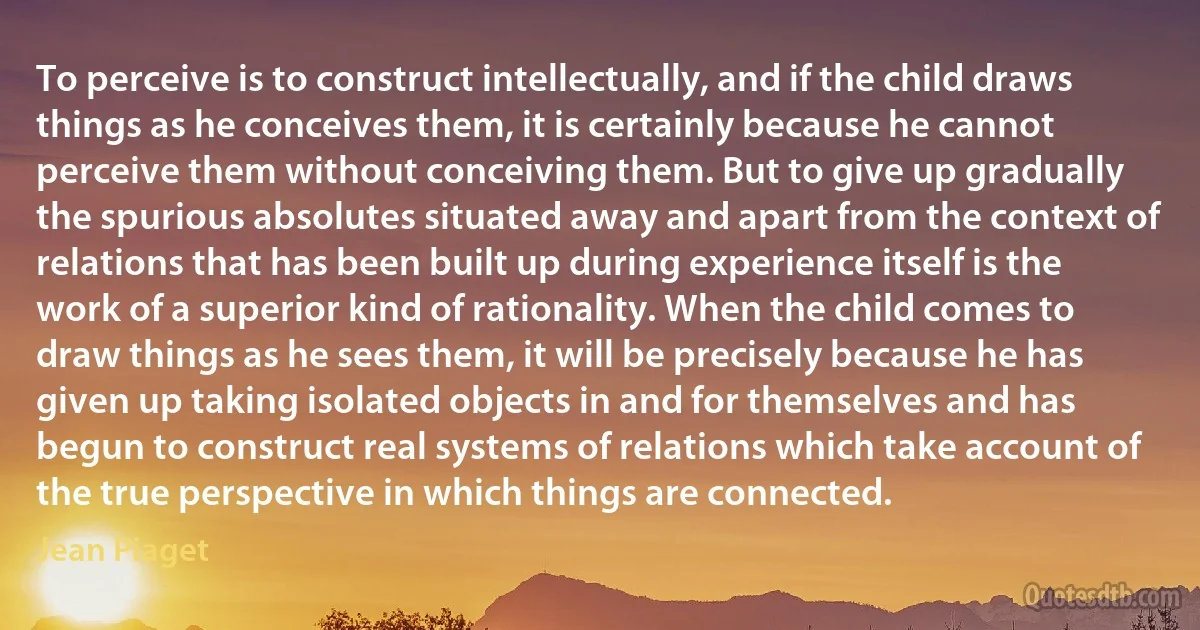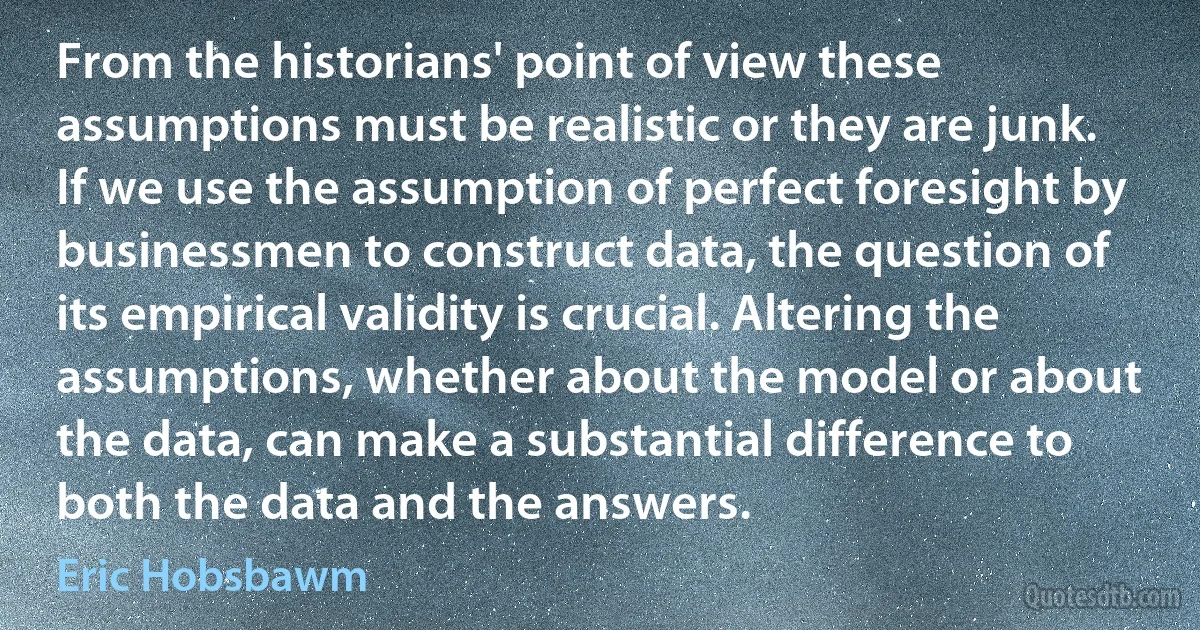Construct Quotes - page 12
Incomplete knowledge of the future, and also of the past of the transmitter from which the future might be constructed, is at the very basis of the concept of information. On the other hand, complete ignorance also precludes communication; a common language is required, that is to say an agreement between the transmitter and the receiver regarding the elements used in the communication process...
[The information of a message can] be defined as the 'minimum number of binary decisions which enable the receiver to construct the message, on the basis of the data already available to him.' These data comprise both the convention regarding the symbols and the language used, and the knowledge available at the moment when the message started.

Dennis Gabor
This is not the first period during which we have confronted the difficult problem of using difference as a way of bringing people together, rather than as incontrovertible evidence of separation. There are more options than sameness, opposition, or hierarchical relations. One of the basic challenges confronting women of color today, as Audre Lorde has pointed out, is to think about and act upon notions of equality across difference. There are so many ways in which we can conceptualize coalitions, alliances, and networks that we would be doing ourselves a disservice to argue that there is only one way to construct relations across racial and ethnic boundaries. We cannot assume that if it does not unfold in one particular way, then it is not an authentic coalition.

Angela Davis
To-day Germany is once more trying to construct, by methods of peace, a Germanic Empire that she failed to bring into being by means of war. That she could never do without eventualities that may change the destinies of a France exposed to every hostile enterprise. What will become of us in this welter of countries the development of whose strength in the future no man can foresee? There are nations that are beginning. There are nations that are coming to an end. Our consciousness of our own acts entails the fixing of responsibilities. France will be what the men of France deserve.

Georges Clemenceau
What am I? I am the desire not to die. I have always been impelled - not that evening alone - by the need to construct the solid, powerful dream that I shall never leave again. We are all, always, the desire not to die. This desire is as immeasurable and varied as life's complexity, but at bottom this is what it is: To continue to be, to be more and more, to develop and to endure. All the force we have, all our energy and clearness of mind serve to intensify themselves in one way or another. We intensify ourselves with new impressions, new sensations, new ideas. We endeavour to take what we do not have and to add it to ourselves. Humanity is the desire for novelty founded upon the fear of death. That is what it is.

Henri Barbusse
I'm trying to write a book about what it means to be human, to grow up, to suffer and learn. My quarrel with much (not all) fantasy is it has this marvellous toolbox and does nothing with it except construct shoot-em-up games. Why shouldn't a work of fantasy be as truthful and profound about becoming an adult human being as the work of George Eliot or Jane Austen? Well, there are a few fantasies that are. One of them is Paradise Lost.

Philip Pullman
There were a lot of utopias in the nineteenth century, wonderful societies that we might possibly construct. Those went pretty much out of fashion after World War I. And almost immediately one of the utopias that people were trying to construct, namely the Soviet Union, threw out a writer called Zamyatin who wrote a seminal book called We, which contains the seeds of Orwell and Huxley. Writers started doing dystopias after we saw the effects of trying to build utopias that required, unfortunately, the elimination of a lot of people before you could get to the perfect point, which never arrived. ... I don't believe in a perfect world. I don't believe it's achievable, and I believe the people who try to achieve it usually end up turning it into something like Cambodia or something very similar because purity tests set in. Are you ideologically pure enough to be allowed to live? Well, it turns out that very few people are, so you end up with a big powerful struggle and a mass killing scene.

Margaret Atwood
In essence, this is the vegetarian (or, as one cult calls itself, a fruitarian) creed, but it has had remarkably little success. The urge to eat meat appears to have become too deep-seated. Given the opportunity to devour flesh, we are loth to relinquish the pattern. In this connection, it is significant that vegetarians seldom explain their chosen diet simply by stating that they prefer it to any other. On the contrary, they construct an elaborate justification for it involving all kinds of medical inaccuracies and philosophical inconsistencies.

Desmond Morris
Notions of objectivity, removed scientific inquiry, unbiased scholarly assessments, empiricism, standardized tests, universalism, evolutionism, and Eurocentric thinking are a few of the many constructs that academics, politicians, and benefactors used to mask the preponderance of whiteness-white ideas, people, and scholarship-as normal. Thus, white racists and capitalists and black accommodationists actively created and maintained this white normality by masking it, by removing the adjectives, by denigrating and downgrading everything non-European, everything outside of the Eurocentric or capitalist homily. European history and literature were not presented as such. Academics labeled it the history and literature. By conceiving of European (and Euro-American) scholarship as superior to all others, they racialized it, they gave it whiteness-an officious social construct of racial superiority.

Ibram X. Kendi
... I have come gradually to understand that the liberal arts cliché about teaching you how to think is actually shorthand for a much deeper, more serious idea: learning how to think really means learning how to exercise some control over how and what you think. It means being conscious and aware enough to choose what you pay attention to and to choose how you construct meaning from experience. Because if you cannot exercise this kind of choice in adult life, you will be totally hosed. Think of the old cliché about quote the mind being an excellent servant but a terrible master. This, like many clichés, so lame and unexciting on the surface, actually expresses a great and terrible truth. It is not the least bit coincidental that adults who commit suicide with firearms almost always shoot themselves in: the head. They shoot the terrible master.

David Foster Wallace
Hegel is (unknowingly) an admirable 'theoretician' of ideology insofar as he is a 'theoretician' of Universal Recognition who unfortunately ends up in the ideology of Absolute Knowledge. Feuerbach is an astonishing 'theoretician' of the mirror connexion, who unfortunately ends up in the ideology of the Human Essence. To find the material with which to construct a theory of the guarantee, we must turn to Spinoza.

Baruch Spinoza
It was the fate of Europe to be always a battleground. Differences in race, in religion, in political genius and social ideals, seemed always, in the atmosphere of our mother continent, to be invitations to contest by battle. From the dawn of history, and we can only conjecture how much longer, the conflicts of races and civilizations, of traditions and usages, have gone on. It is one of the anomalies of the human story that these peoples, who could not be assimilated and unified under the skies of Europe, should on coming to America discover an amazing genius for cooperation, for fusion, and for harmonious effort. Yet they were the same people when they came here that they had been on the other side of the Atlantic. Quite apparently, they found something in our institutions, something in the American system of Government and society which they themselves helped to construct, that furnished to all of them a political and cultural common denominator.

Calvin Coolidge
I think my work still has a distinctive voice that is uniquely mine-and that voice is one of a person speaking Spanish in English. By that I mean that I write with the syntax and sensibility of Spanish, even when there isn't a syllable of Spanish present. It's engrained in the way I look at the world, and the way I construct sentences and stories. I was not aware of this when I wrote House, but I'm conscious of it now. What remains the same? Well, I am still as astonished by the world and as intuitive/foolish as ever, but I am aware that this is a good thing, and not ashamed of it as I was when I was young. The difference now is that I know myself. I think my writing is wiser, and, I hope, more complex.

Sandra Cisneros
History, I was learning, is the story we tell ourselves about what really happened. My task as a writer/novelist was to try to get as many versions of that reality and then imaginatively construct the story. The fact that there were so many versions of what really happened should not surprise us: After all, we experience history as individuals through our particular characters, personalities, points of view. This reality of how we live history ideally suits the form of a novel, which focuses on "the truth according to character.

Julia Alvarez
I could hear the mild voice of my Companion pointing the moral of my vision, and stimulating me to aspire, and to teach others to aspire. He had been angered at first - he confessed - by my ambition to soar to Dimensions above the Third; but, since then, he had received fresh insight, and he was not too proud to acknowledge his error to a Pupil. Then he proceeded to initiate me into mysteries yet higher than those I had witnessed, shewing me how to construct Extra-Solids by the motion of Solids, and Double Extra-Solids by the motion of Extra-Solids, and all "strictly according to Analogy", all by methods so simple, so easy, as to be patent even to the Female Sex.

Edwin Abbott Abbott
The deeper question that lies behind the above banalities is whether the rules of baseball are similar to or radically different from the rules of science. Clearly they are radically different. Like the rules of chess and bridge, the rules of baseball or made by humans. But the rules of science are not. They are discovered by observation, reasoning, and experiment. Newton didn't invent his laws of gravity except in the obvious sense that he thought of them and wrote them down. Biologists didn't "construct” the DNA helix; they observed it. The orbit of Mars is not a social construction. Einstein did not make up E=mc the way game rules are made up. To see rules of science as similar to baseball rules, traffic rules, or fashions in dress is to make a false analogy that leads nowhere.

Martin Gardner


